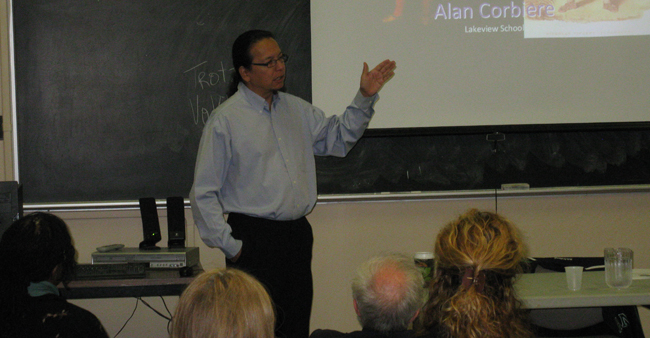Concordia now offering First Peoples Studies Bachelor Degrees

By Karl Hele
MONTREAL – Concordia University now offers a Major and Minor Bachelor’s degree in First Peoples Studies (FPST).
First Nation students such as Thea Cammie, can now “explore my Mi’kmaq/First Nations identity further.”
Non-indigenous student Eunice Kreuger, who has lived in Nunavut her entire life, can “deepen my understanding of … First Peoples” to gain a “better understanding of decolonization … and the development of First Peoples issues and struggle to regain self-determination, and most importantly to me,” “to get a degree that would be relevant to where I came from and where I was going.”
After more than a dozen years in the making, the province wide University Programs Committee recommended that the Minister for Higher Education, Research, Science and Technology, Pierre Duchesne, approve the major program in July 2013, while the minor was running since January 2013.
The approval represents a huge step forward for Indigenous-based education in Quebec and eastern Canada. Currently FPST has two full time faculty members, Drs. Karl Hele (Anishinaabe) and Louellyn White (Mohawk) along with several part-time faculty who are from Huron, Cree, Mohawk, Metis, and Settler Nations.
FPST is currently housed as a semi-autonomous unit within the School of Community and Public Affairs (SCPA), a department that is well known in Quebec for its commitment to social justice. The program’s core philosophy is based on Medicine Wheel teachings with emphasis being placed on First Peoples in Quebec and Canada. FPST requires students to take courses that present the perspectives of the three basic language groups within the province – Inuit, Haudenosaunee (Iroquois)and Algonquian (Cree, Algonquin, Mi’kmaq, and Abenaki) – whose history, culture and languages are emphasized. Additionally, students are required to take broader courses on politics, law, health, and justice.
Simply, all courses are “taught from First People perspectives and based on sound, culturally sensitive research. The program’s aim is to bring accurate awareness and a better understanding of First Peoples issues, develop further understanding of society’s standing in relation to First Peoples, and build mutual understanding between Quebec society and First Peoples.
Students have registered in FPST courses, as well as the minor and major for a variety of reasons.
Cammie’s decision to register in FPST “was influenced both by my identity and the work I had and continue to do with the Friendship Centre in St. John’s”. For her, “FPST felt more relevant to my life, and the work I was doing.” She has found that “the work I do at home informs my school experience and the topics I choose to research, while what I take away from the FPST classes finds its way into a lot of the work I have done at home/in the Urban Aboriginal community.”
Similarly, Kreuger believes the program will enable her “to return [to Nunavut] long term, so I see this as important for working in almost any field in the territory whether it is on a family, community, or territorial level.” Without the program, Kreuger felt her initial program choice not to be “what I was looking for”, after taking a couple of FPST courses for interest she decided to enroll in the program. For her, “It is what kept me interested in coming back to school each semester, feeling like I was leaving my home and community for a purpose that truly meant something … Without the program … I may not have made it so close to finishing a degree.”
Other students enrolled in the introductory courses, who expressed a wish to remain anonymous, see FPST as key to better relations between newcomers and First Peoples. For instance, when asked why they decided to undertake a FPST course, students responded with a variety of reasons:
– “I hope to have a less biased interpretation … and to better understand current issues face by Native communities.”
– “I want to debunk the education I received from my conservative highschool. I want to further my knowledge and understanding so I am able to educate others and engage in political conversation.”
FPST at Concordia will rise to these challenges of the student body to expand their knowledge whether settler or First Peoples as well as develop into a hub for research with communities from across Quebec and Canada.

